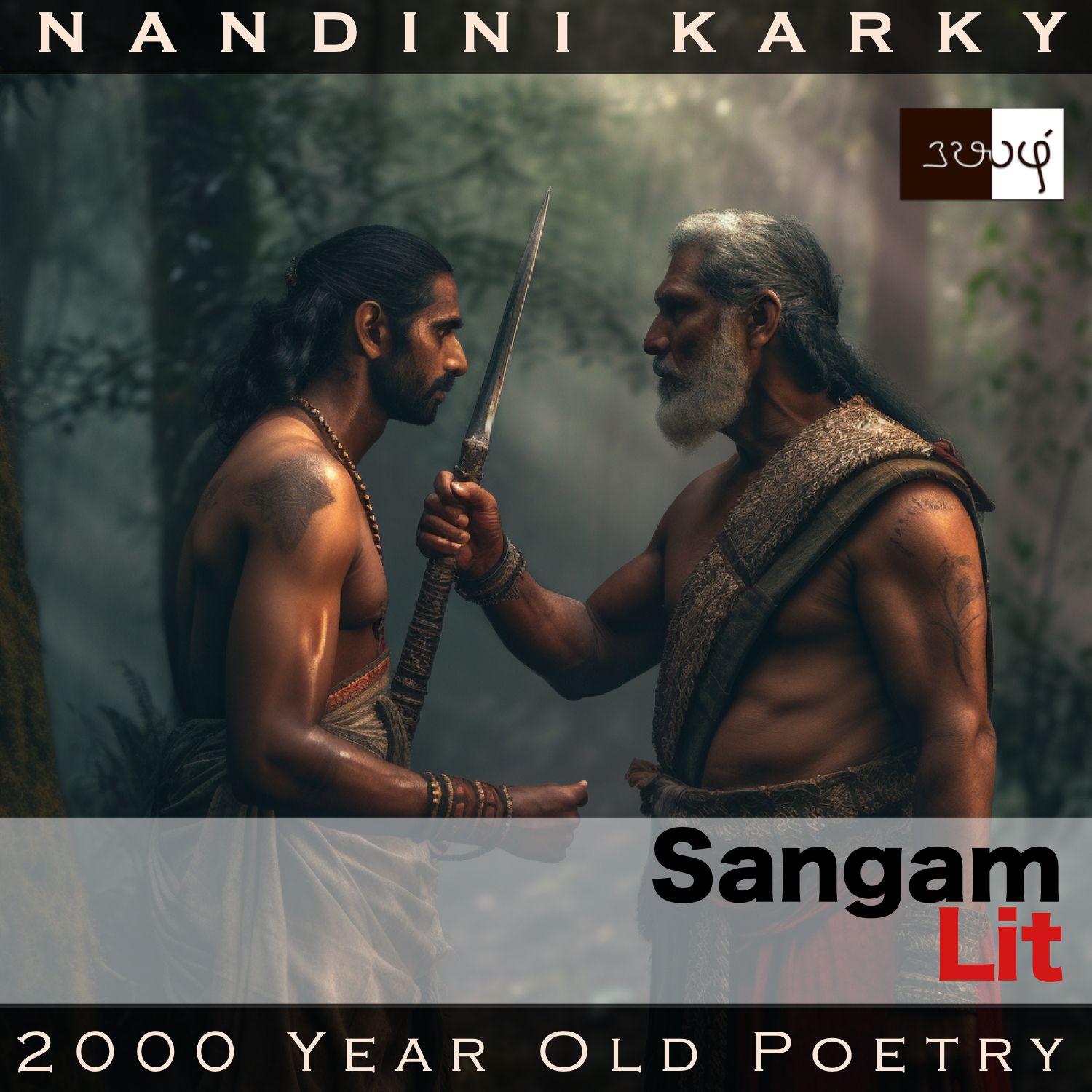Podcast: Play in new window | Download
Subscribe: Apple Podcasts | Spotify | Amazon Music | Android | iHeartRadio | TuneIn | RSS | More
In this episode, we encounter a dramatic event involving a poet and a king, as depicted in Sangam Literary work, Puranaanooru 165, penned about the Velir King Kumanan by the poet Perunthalai Saathanaar. Set in the category of ‘Paadaan Thinai’ or ‘King’s praise’, the verse takes a message of deep significance to the king’s brother.

மன்னா உலகத்து மன்னுதல் குறித்தோர்
தம் புகழ் நிறீஇத் தாம் மாய்ந்தனரே;
துன் அருஞ் சிறப்பின் உயர்ந்த செல்வர்,
இன்மையின் இரப்போர்க்கு ஈஇயாமையின்,
தொன்மை மாக்களின் தொடர்பு அறியலரே;
தாள் தாழ் படு மணி இரட்டும், பூ நுதல்,
ஆடு இயல் யானை பாடுநர்க்கு அருகாக்
கேடு இல் நல் இசை வய மான் தோன்றலைப்
பாடி நின்றனெனாக, ‘கொன்னே
பாடு பெறு பரிசிலன் வாடினன் பெயர்தல் என்
நாடு இழந்ததனினும் நனி இன்னாது’ என,
வாள் தந்தனனே, தலை எனக்கு ஈய,
தன்னின் சிறந்தது பிறிது ஒன்று இன்மையின்;
ஆடு மலி உவகையொடு வருவல்,
ஓடாப் பூட்கை நின் கிழமையோற் கண்டே.
A verse that throws light on the question put forth in the previous verse asking if it was right on the poet’s part to go seeking to the king, when the king had lost everything and was living in a jungle. These words of the poet to the usurper of Kumanan’s kingdom, the younger brother, will tell us more:
“Those who wanted permanence in this transient world, made sure to establish their fame before they perished; However, as wealthy men, renowned for being unapproachable, rendered not unto the impoverished, who came seeking to them, they know not how to remain connected to this world in the manner of their generous ancestors;
I stood there singing the praises of that great leader with speedy horses, the one of impeccable fame, he who gave ceaselessly to poets and performers, killer elephants with flowerlike foreheads and resounding bells that dangle low by the animal’s legs. Just then, he turned to me and said, ‘It’s terrible to have a supplicant leave empty-handed even more than the loss of my kingdom’. Saying so, he handed me his sword so as to gift his head to me, as he had not anything else to give. Moved by exhilarating emotion, I came thither after seeing that unrelenting determination of your elder brother!”
Time to delve into the nuances of these words. The poet starts in an abstract fashion talking about what people who want to live even after they die do. He says they find the right way to install their fame. On the other hand, there are certain others, wealthy to the core, but are known for being unapproachable, and so they do not give generously like their ancestors, and consequently, they leave no connection with this world. Let’s return to this statement and its meaning after we have listened to what else the poet has to say!
From these abstractions about generosity, wealth and fame, the poet turns to describe King Kumanan’s nature, who used to give generously to those who came seeking to him. He gave not just some precious jewels or vessels but whole war elephants, adorned with bells. The poet then recollects how when he stood there singing the praises of the king, the king exclaimed that even more than losing his kingdom, what would pain him is to have nothing to give to a supplicant, who came with hope to him. Declaring he was not going to accept that, the king took out his sword and handed it to the poet and demanded that the poet cut off the king’s head and take it as his gift, as there was nothing else for the king to give. ‘After these momentous words from your elder brother, I rushed here to your court’, concludes the poet to King Kumanan’s younger brother.
Now, we can infer that amidst those abstractions about ancestors leaving behind their fame and certain wealthy others losing their connection with the world, the poet is talking in a hidden manner about the greatness of King Kumanan and the apathy of Kumanan’s younger brother. Returning to those words about a king offering his own head so as to render unto this poet, through that portrait of the king, the poet shocks the audience. Possibly the younger brother is moved by the greatness of his sibling’s virtue and makes amends with him. So, we have an answer to that earlier question in that the poet was right in asking that king, even when the king had nothing, for only that led to the exposition of the king’s greatness – an event momentous enough to bring transformation in the minds of others. And thus, in this verse about two brothers, we see the power of words in bridging the hearts of two and changing the course of history too!




Share your thoughts...